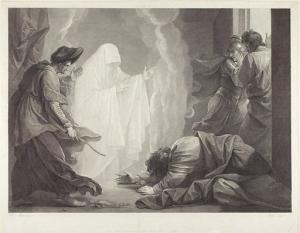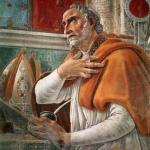Necromancy; Can Saints Hear Us?
Seth Kasten (see his blog) is a member of the Lutheran Church–Missouri Synod. This is one of a series of replies to his book, Against the Invocation of Saints: An Apology for the Protestant Doctrine of Prayer over and against the Doctrine of the Eastern Orthodox Church (Royal Oak, Michigan: Scholastic Lutherans, 2023). I will be using RSV for Bible passages unless otherwise noted. Words from his book will be in blue.
See other installments:
*****
Necromancy and invocation of saints, while not identical, share an obvious parallel: communication with the dead, including the faithful departed, such as Samuel. . . . My argument against invocation of saints with respect to necromancy is twofold: 1) Necromancy is similar to invocation, and necromancy is very evil, so we should be, at the very least, hesitant to practice invocation, and 2) Necromancy seems to require a medium, which suggests that contacting the dead without a medium is impossible, which implies that invocation is fruitless. (p. 58)
This is very poor reasoning. Seth argues that because necromancy and invocation of the saints both have the characteristic of communicating with the dead, therefore, invocation must be discarded and is impermissible, and indeed immoral. Necromancy is evil; therefore, invocation must also be.
It’s like arguing that two people in an adulterous affair and a happily married couple both engage in sexual intercourse. Because the adulterers do this, and adultery is evil, therefore, sexual relations of married couples are evil, too. Then he contends that because necromancy requires a medium, therefore any contact with the dead whatsoever must also require a medium. These are all terrible arguments, with false premises, bad logic, and conclusions that era false as a result.
But there is an easier way to completely disable such reasoning. Both our Lord Jesus and St. Peter invoked the dead. Jesus did when He raised Lazarus:
John 11:43-44 When he had said this, he cried with a loud voice, “Lazarus, come out.” The dead man came out, . . .
. . . and when He raised Jairus’ daughter:
Mark 5:41 Taking her by the hand he said to her, “Talitha cumi”; which means, “Little girl, I say to you, arise.” (cf. Lk 8:54: “Child, arise”)
St. Peter did the same thing:
Acts 9:37, 40 In those days she fell sick and died; and when they had washed her, they laid her in an upper room. . . . But Peter put them all outside and knelt down and prayed; then turning to the body he said, “Tabitha, rise.” And she opened her eyes, and when she saw Peter she sat up.
That settles that! If God Himself (as a man on earth) and an apostle both invoked or contacted the dead, and the dead heard them, then it cannot be an evil practice. We must bow to their examples. God can’t possibly sin; nor can Jesus do something that would lead us astray. Whatever He does cannot be sinful. Peter could and did sin, but if he had in this instance, Scripture would have pointed that out, as it did when Paul rebuked him for temporary hypocrisy regarding the Gentiles. But the Bible couldn’t indicate that he was wrong in this instance, because He did what Jesus did; therefore it can’t be wrong. Case closed.
Moreover, Jesus told His twelve disciples to “raise the dead” (Mt 10:8), and His words in the next chapter indicate that they successfully performed this miracle: “Go and tell John what you hear and see: . . . the dead are raised up . . .” (Mt 11:4-5; cf. Lk 7:22). Now, if the three examples we have in the New Testament report that the dead were spoken to (commanded) before being raised, then it stands to reason that other instances of the dead being raised probably entailed the same thing, which would be yet more support for invoking the dead.
The Bible condemns necromancy on multiple occasions (Lev. 19:31, 20:6, Deut. 18:11, etc). It is also seen in the famous examples of the witch of Endor and the evil people under King Josiah. . . . this practice is condemned many times and was even punishable by stoning (Lev. 20:27), . . . Isaiah 8:19 demonstrates that there is an inherent problem of the people communicating with the dead on behalf of the living: “And when they say to you, ‘Seek those who are mediums and wizards, who whisper and mutter,’ should not a people seek their God? Should they seek the dead on behalf of the living?” (pp. 58-59)
Of course we completely agree. The difference arises because of Seth’s (and Protestantism’s) failure to distinguish between conflicting essential aspects of invocation of saints over against necromancy. The two things differ in essence. One is always evil, and the other is perfectly moral and biblical.
Every example of necromancy practiced in the Old Testament includes a medium, which suggests that contacting the dead is not normally possible without a medium. In this case, attempting to contact the dead, such as by invocation, is, at the very least, fruitless since it is impossible. (p. 60)
It’s this statement by Seth that is impossible, because Jesus and Peter both did this very thing. If someone argues that Jesus was a special case, being God, then they still have to explain how Peter could have doe it, and how the biblical text casually accepts the practice.
Critics of these practices like Seth in effect argue: “It is still not clear at all that these Catholic practices are any different from séances and wicked, forbidden occultic techniques. What’s the difference? Catholics are messing around with dead spirits, too, but the Bible condemns any sort of magic, sorcery, necromancy, or witchcraft.” Catholics fully agree that these occultic things are prohibited, but deny that the communion of saints is a practice included at all in those condemnations.
The difference is in the source of the supernatural power and the intention: if a Christian on earth asks a saint to pray for him, this is directly supported by the biblical indications above, and God is the one Whose power makes the relationship between departed and living members of the Body of Christ possible.
The medium in a séance, on the other hand, is trying to use her own occultic powers to “conjure up” the dead. That also opens up the possibility of demonic counterfeit. Catholics aren’t “conjuring” anyone or trying to use self-generated occultic powers. We’re simply asking great departed saints to pray for us. If they are aware of the earth, then God can also make it possible for them to “hear” and heed our prayer requests. If this weren’t the case, then saints and angels in heaven wouldn’t be portrayed as they are in Scripture: intensely active and still involved in earthly affairs.
My friend David W. Emery, with whom I worked as a moderator at the Coming Home Network Discussion Forum, from 2007 to 2010, made a helpful comment about this issue:
We must make the distinction between saints and “spirits” in general. I mentioned above that necromancy deals with the souls of the damned or evil spirits (what we call demons). This is in consonance with its goals and intents. On the other hand, a saint is not in hell, but in heaven; the same is true of an angel. If the angel Gabriel can speak to Zacharias, Mary, Joseph and the shepherds (Luke 1:11–20, 26–38; 2:9–14; Matthew 1:20–21; 2:13, 19–20), so can a saint. For they are both spirits from heaven and on a mission from God.
Catholic apologist Jimmy Akin provides a great explanation of the essential difference between the two practices:
Necromancy is an attempt to gain information by conjuring the dead. The term is derived from the Greek words nekros (“dead person”) and manteia (“oracle, divination”). This practice, which was common in the ancient world, is forbidden in the Old Testament: “There shall not be found among you . . . a medium, or a wizard, or a necromancer” (Deut. 18:10–11).
The fact that necromancy was for purposes of gaining information is made clear by the Hebrew terms for “medium” (sho’el ’ob, “a spirit inquirer”), “wizard” (yidde‘oni, “a spiritist”), and “necromancer” (doresh ’el-ha-metim, “an inquirer of the dead”). The focus on gaining information is also made clear by the context in Deuteronomy, which specifies that God will send his people prophets instead of allowing them to use mediums, wizards, and necromancers (Deut. 18:15). . . .
Both Scripture and the Catholic Church [CCC 2116] agree that necromancy is forbidden. However, asking the saints for their intercession is a fundamentally different practice. In necromancy, people attempt to contact the dead to obtain information from them—either about the future or about other matters that are hidden from the inquirer. The flow of information is supposed to be from the dead to the living.
When people ask the saints for their intercession, however, they are not seeking information. They are asking the saints to partner with them in prayer to God. If anything, the flow of information is from the living to the dead—that is, a living person is making his prayer request known to a departed saint.
If it were not forbidden by scripture to invoke others than God, the practice might be permissible, even if it went unmentioned . . . (p. 60)
But not all invocation is forbidden, as I just proved with examples of behavior from Jesus and Peter. Only occultic-type contact with a medium or sorcerer, etc., is forbidden, and we just learned why and what the essential difference is, in the section above. As Jimmy Akin wrote, “The biblical injunction against necromancy is thus a condemnation of something else. It is not talking about the same thing.”
But scripture and the early fathers teach that the saints cannot hear us or know what occurs on earth, so it follows that we cannot pray to them, as this would be a violation of what scripture teaches us about saints. (p. 60)
Many Church fathers think they can hear us, because they recommend asking for their intercession, as I showed in my last installment. As for Scripture, it teaches us many things about departed saints. Now we only “see in a mirror dimly” as Paul stated (1 Cor 13:12), and that “eye has not seen” (1 Cor 2:9) etc. what God has prepared for us. Paul wrote how he was “caught up into Paradise” and “heard things that cannot be told, which man may not utter” (2 Cor 12:3-4). He also wrote that we shall see God “face to face” and stated that “Now I know in part; then I shall understand fully” (1 Cor 13:12).
John teaches that “when he [Jesus] appears we shall be like him” (1 Jn 3:2). Christians “are being changed into his likeness from one degree of glory to another” (2 Cor 3:18). This will be perfected in heaven. Human beings can be “filled with all the fulness of God” (Eph 3:19) and attain “the fulness of Christ” (Eph 4:13) and become “partakers of the divine nature” (2 Pet 1:4). All of that will fully and massively occur in heaven too.
We are supposedly required to believe that even though saints in heaven possess all of these extraordinary characteristics, being able to hear an intercessory request or a petition from people on earth is not part of their abilities or experience? It’s just not plausible — or biblical. God can do anything, and He is the one Who enables dead saints to hear petitions. Hebrews 12:1 and Revelation 6:9-10 (“I saw under the altar the souls of those who had been slain for the word of God and for the witness they had borne; they cried out with a loud voice, ‘O Sovereign Lord, holy and true, how long before thou wilt judge and avenge our blood on those who dwell upon the earth?’ “) prove that the saints are quite aware of happenings on earth. The ability to hear a human petition is clearly implied.
If we’re “like” or “equal to” angels after death, according to Jesus (Lk 20:36) and we know that angels communicate with those on earth (many examples in the Bible), then it stands to reason that the dead saints will by analogy be able to do the same thing. Jesus said, “I tell you, there is joy before the angels of God over one sinner who repents” (Lk 15:10). That’s an interior disposition. If angels know that, and we will be “equal” to them, then dead saints in heaven can certainly hear a petition, since by analogy to the angels they’ll be able to discern interior thoughts. Moreover, the Bible repeatedly says that we will be like God in heaven, too, including understanding “fully” (1 Cor 13:12).
Also, departed saints and angels present our prayers to God in heaven (Rev 5:8; 8:3-4). What are they doing with them, pray tell (no pun intended)? Why do they have them; how did they obtain them? The most logical, feasible explanation is that they had received prayers (technically, intercessory requests) from people on earth as intermediaries to God (just as we ask others on earth to pray for us or some cause).
Someone might reply that God gave our prayers to them. But why would He do that? The same question would still arise: what do they do with them?: file them away in heavenly file cabinets? Whatever they do with them would merely prove our point: that He intended them to be involved in some way in the process of prayer in the first place. Therefore, it would still be (in this proposed scenario) perfectly proper to ask saints and angels to intercede on our behalf to God. The proposed “solution” here, in the final analysis, is only a variation of the same thing Catholics and Orthodox maintain.
Lastly, “elders” in heaven (dead saints) spoke to St. John (Rev 5:5; 7:13-17), and John spoke to one of them (Rev 7:14). Angels also spoke to John (Rev 1:1-2; 10:9, 11; 11:1-2; 17:1-2; 7-18; 19:9-10; 21:9, 15; 22:6-11), and he talked to one of them (Rev 10:9). St. John wasn’t in heaven at the time; he was “on the island called Patmos” (Rev 1:9). This is the communion of saints: explicitly taught in the Bible. We can communicate to dead saints and angels in heaven (including prayerful petitions) and they can communicate back to us.
*
***
*
Practical Matters: Perhaps some of my 4,500+ free online articles (the most comprehensive “one-stop” Catholic apologetics site) or fifty-five books have helped you (by God’s grace) to decide to become Catholic or to return to the Church, or better understand some doctrines and why we believe them.
Or you may believe my work is worthy to support for the purpose of apologetics and evangelism in general. If so, please seriously consider a much-needed financial contribution. I’m always in need of more funds: especially monthly support. “The laborer is worthy of his wages” (1 Tim 5:18, NKJV). 1 December 2021 was my 20th anniversary as a full-time Catholic apologist, and February 2022 marked the 25th anniversary of my blog.
PayPal donations are the easiest: just send to my email address: [email protected]. Here’s also a second page to get to PayPal. You’ll see the term “Catholic Used Book Service”, which is my old side-business. To learn about the different methods of contributing (including Zelle), see my page: About Catholic Apologist Dave Armstrong / Donation Information. Thanks a million from the bottom of my heart!
*
***
Photo credit: Saul and the Witch of Endor (1788), by William Sharp (English, 1749-1824), after Benjamin West (1738-1820) [public domain / Look and Learn]
Summary: One of my series of replies to Lutheran Seth Kasten on the invocation of saints. I address his objections and biblical and patristic arguments against the practice.














